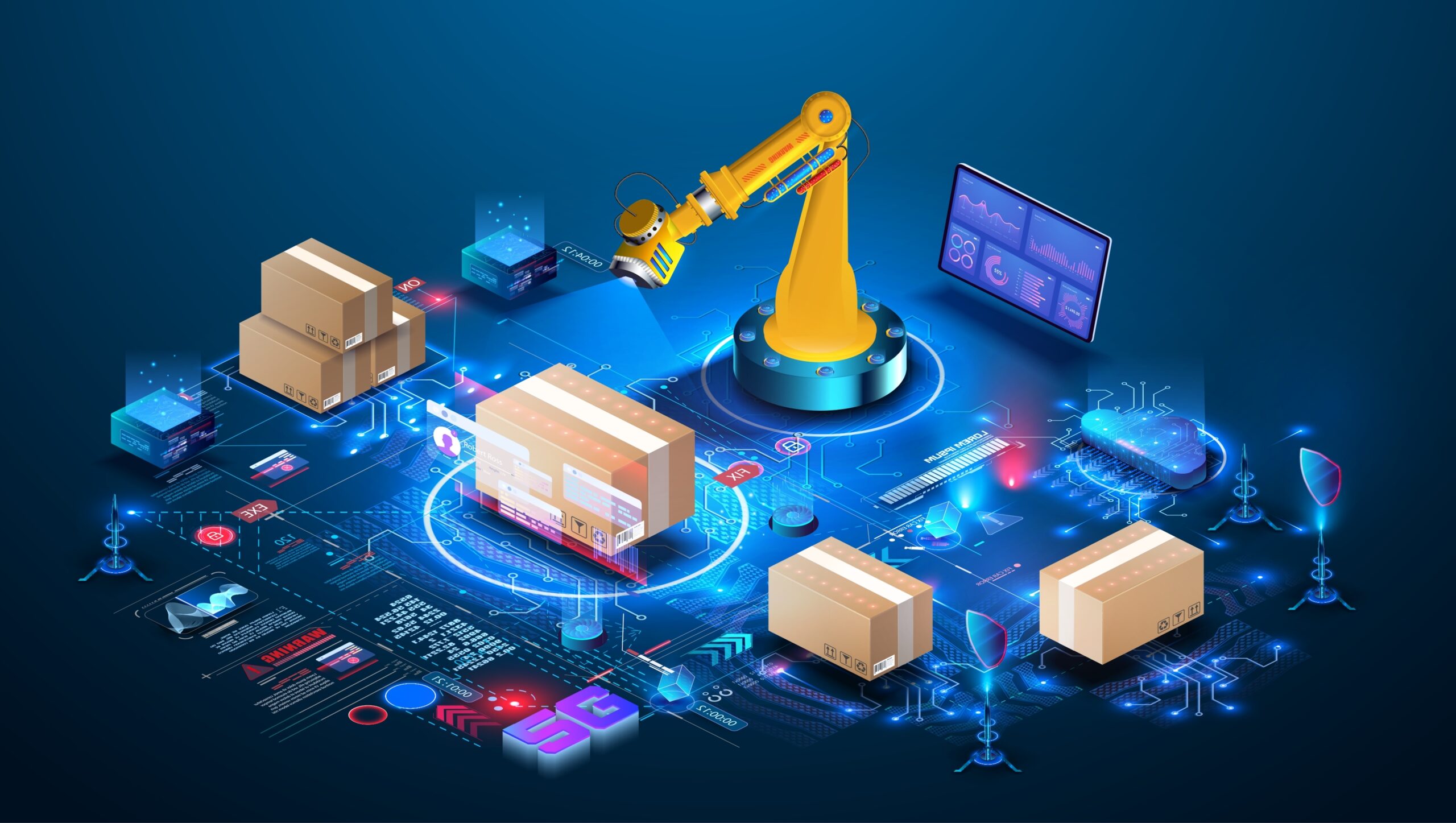AI in Supply Chain: Revolutionizing Logistics and Operations
March 01, 2024
Supply chain and logistics educational programs must remain up to date on the latest industry trends if they want to prepare students for a successful career. Considering this imperative, they must also stress the benefits of technology in supply chain management.
Perhaps more than any other area of innovation, artificial intelligence (AI) is defining today’s rapidly evolving technological landscape. In particular, the global shipping and logistics sectors are leveraging the power of AI to both streamline and improve all kinds of processes.
Read on to learn more about the place of artificial intelligence in supply chain operations.
How Artificial Intelligence Transforms Logistics Operations
From market volatility to environmental concerns to unforeseeable natural catastrophes such as the COVID-19 pandemic, supply chains face more challenges today than ever before. While it is far from a cure-all, AI has stepped in to help supply chain and logistics professionals face and overcome these obstacles.
Gaining a Competitive Edge With AI in the Supply Chain
Companies that integrate the right AI can better track and manage incoming and outgoing inventory, but this is only the beginning of the competitive advantages that supply chain-related AI can deliver. By analyzing huge volumes of data in real time, AI can detect problems instantly, identify areas of improvement, automate routine tasks, understand causal relationships, and support better decision-making.
Enhancing Efficiency and Accuracy with AI
When it comes to delivering swift and precise results, AI is an absolute game changer in the supply chain and logistics field. AI systems owe their accuracy to built-in quality control systems that not only find anomalies but also correct them automatically.
AI-Driven Decision-Making in Supply Chain Management
AI has revolutionized global supply chain and logistics operations with its remarkable ability to analyze vast amounts of information—discovering patterns and making predictions. This innovation aids management professionals in mitigating risk, increasing quality, boosting productivity, improving customer satisfaction, and reducing costs.
Overcoming Challenges in the Implementation of AI in Supply Chains
While there are many profound benefits of integrating AI into supply chain operations, there are many challenges associated with its initial implementation. You must begin with a clearly articulated vision that includes several specific objectives. Next, take the time to thoroughly test all technology you plan to use and evaluate its various performance benchmarks. Finally, you must prepare your team for the AI transformation, touting its advantages while warning that its implementation will be likely to cause operational disruptions.
Addressing Data Quality and Infrastructure Issues
Accurate information is essential if you want to engender information-driven change. This holds true whether you are using AI tools or not. Because AI can only work with the initial data that you provide it, supply chain organizations must assess and prepare this data as a key part of the AI implementation process.
Selecting the Right Technology and Vendor for AI Adoption
Like quality providers of all types of goods and services, the best providers of AI tech will be able to demonstrate a proven track history of solution delivery. As a supply chain/logistics professional, you should seek out AI developers and vendors with industry-specific expertise. Other key selection criteria to consider include their dedication to data security, their system customization capabilities, and both their integration and post-integration support services.
Everyday Benefits of Incorporating AI into Supply Chains
AI-driven supply chains allow companies to boost their financial bottom line by cutting purchasing and production expenses. Beyond identifying and addressing costly problems, AI can greatly improve operational efficiency through automation. Additionally, its ability to accurately analyze massive amounts of information can help supply chain and logistics leaders make significantly better decisions.
Improved Forecasting and Demand Planning
In terms of decision-making assistance, it is hard to beat the extraordinary modeling and forecasting capabilities of AI. Put succinctly, AI can effectively predict the future when it is given the right data to work with. Through machine learning, AI can also inform itself to anticipate circumstances and proactively react to dangers in ways that human beings simply cannot. The most obvious benefit of AI forecasting and demand planning is preventing scenarios that lead to pronounced overstocking or running out of stock completely. Effective AI inventory management can structure timely and logical procurement and distribution procedures that lead to more productive relationships with suppliers and shippers.
Optimized Inventory Management With AI
Thanks to its amazing ability to monitor inventory and improve supply chain operations, AI can shorten delivery periods and better ensure on-time delivery. In addition, it benefits consumers by allowing them to receive updates and track shipments in real time. AI helps companies maintain optimum inventory levels and identify the most cost-effective ways to transport this inventory.
Preparing Your Supply Chain for AI Integration: A Step-by-Step Approach
After choosing the right AI tech and vendor, different supply chain professionals working for different organizations will want to tailor AI integration processes to meet their unique situations and goals. While there is no one-size-fits-all solution to effective AI integration, the following general steps are a great place to start.
Establishing Goals and Organizing Data
Because you cannot get where you want to go without a firm destination in mind, goal-setting should be the very first step in the AI implementation process. Because an AI system is only as good as the data it receives, data organization should be the second. Of course, you will want to keep your goals in mind when refining your data architecture, while simultaneously ensuring that it is organized for maximum compatibility with the right AI algorithms.
Selecting AI Technologies and Algorithms
As detailed above, company reputation, industry-specific expertise, data security, customization capabilities, and both integration and post-integration support services are all important things to consider when selecting AI technology to support your supply chain/logistics operations. You will also want to take a close look at each vendor’s technology stack and their various programming languages, frameworks, and algorithms to ensure full compatibility with your existing procedural and technical infrastructure.
Integrating AI With Current Systems and Testing
A quality vendor will guide supply chain and logistics professionals as they prepare for AI integration and launch AI capabilities. To avoid future headaches, thorough systems testing should play a major role in all these processes. Furthermore, AI systems should be programmed to engage in continuous testing to chart ongoing progress and evaluate new strategies. By learning from each set of test results and delivering relevant data to decision-makers, AI strives for constant improvement.
Unleashing the Full Potential of AI in Supply Chain Management
While it is evolving quite rapidly, most tech experts agree that AI technology is still in its infancy. Read on for a brief overview of AI’s massive potential and tips on how to benefit from it.
Future Predictions for AI in Supply Chain Operations
Experts see big things for AI in supply chain and logistics operations in 2024 and beyond. Buoyed by significant ongoing improvements in predictive analytics and demand forecasting, AI’s role in inventory management will expand. Similarly, improvements in intelligent automation will make supply chain and logistics processes more efficient and less costly than ever before. Experts also predict far greater interconnectivity among equipment, inventory, and professionals in every link of the supply chain than to technological advancements in the Internet of Things (IoT).
Making Your Supply Chain Future-Ready with AI
From helping organizations avoid shipping bottlenecks to providing consumers end-to-end supply chain visibility, the advantages that AI offers will become expected necessities as the ceaseless march of technology progresses. By adopting and implementing AI today, you can prepare yourself for uninterrupted success moving forward.
Practical Applications of AI in Supply Chain and Logistics
AI promises more effective, efficient, precise, and productive operations up and down the supply chain. But what exactly does this mean? Let’s take a closer look at just a few aspects of shipping and logistics that stand to benefit greatly from AI technology.
AI for Enhanced Warehouse Management
Warehouses rank among the top supply chain beneficiaries for technological advancements in the Internet of Things (IoT), as mentioned above. Driven by comprehensive AI systems, warehouse IoT involves the placement of sensors and readable codes on both physical equipment and inventory items to monitor environmental conditions, track movement, and provide real-time transparency for all operations. AI has proven effective at recording accurate warehouse inventory levels, too—reducing operational errors, increasing operational speed, and preventing operational waste.
AI in Streamlining the Loading Process
Through advanced predictive planning and logical scheduling, AI can prevent shipping bottlenecks and generally make loading processes far more effective. Beyond these improvements, AI can transform loading processes entirely when paired with compatible material-handling robotic equipment. Driven by an AI “brain,” intelligent robotic units can go beyond loading and unloading to shelve, organize, pick, and pack specific inventory items, all while navigating environments autonomously and learning from their successes as well as their mistakes.
AI’s Role in Cost-Savings and Revenue Boosting
The added value that AI contributes in terms of both effectiveness and efficiency translates to an improved financial bottom line. According to independent business research by McKinsey & Company, 61% of manufacturing executives report decreased costs after integrating AI into supply chain operations. Likewise, 53% of manufacturing executives report increased revenues after AI integration.
Human Intervention in AI-Powered Supply Chains: Why It Matters
Although it has the potential to mimic human thought and instincts to a degree that is sometimes startling, AI is far from human in its inherent awareness. In terms of supply chain and logistics management, this means that it may misunderstand fundamental aspects of business operations that might be obvious to the ordinary person. As previously noted, AI systems are only as effective as the data that they receive. For these reasons and others, human intervention must be an essential component of any AI system, no matter how efficiently it runs and how quickly it learns on its own.
Will AI Replace Humans in the Supply Chain Industry?
It is certainly a powerful tool when placed in the right human hands, but AI won’t be replacing human beings in supply chain and logistics management anytime soon. The industry-changing effects of AI are vast and will impact employment in many ways, but human ingenuity will remain essential.
Learn More About AI as Part of Supply Chain and Logistics Operations
A good post-secondary educational program will not only deliver basic supply chain and logistics principles but also address AI and other modern advancements that are rapidly revolutionizing the field.
The Global Supply Chain and Logistics Management program at North American Trade Schools (NATS) makes learning even easier by offering classes 100% online. Learn and request more information about this program with NATS today.





